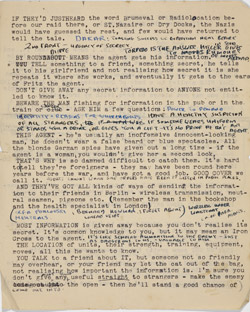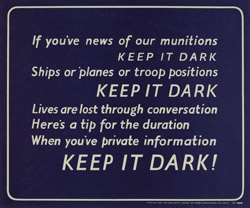Secrets, Security and Escape: 1939–1945

Notes of a lecture on the need for security, given to Allied troops by John Harold Goodland. MS Add. 9704/5/1, f. 1v
British intelligence came of age in the Second World War: its greatest successes were the running of a double-cross system which enabled it to control German agents operating in this country and feed the enemy with false information, and the famous signals intelligence and code-breaking work done at Bletchley Park. But throughout the conflict, more mundane but vitally important work was done training the British population—both civilians and the rapidly-expanding armed forces—in the practice of basic security: the keeping of secrets and the avoidance of careless slips in the handling of information. Publicity campaigns highlighted the usefulness to the enemy of apparently trivial information and emphasised the potentially disastrous consequences of its disclosure, while troops were drilled in the need for discretion. The Military Intelligence services also ran secret escape lines in occupied Europe, and assisted aircrew on the bomber offensive with maps and other covert equipment.

A poster stressing the need for security, issued by H. M. Stationery Office in the first few months of the Second World War. War Poster 30. Crown Copyright.
